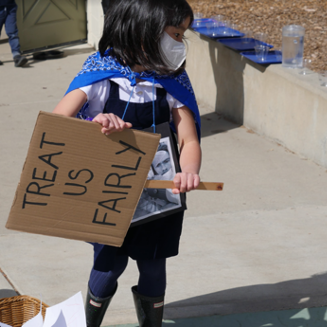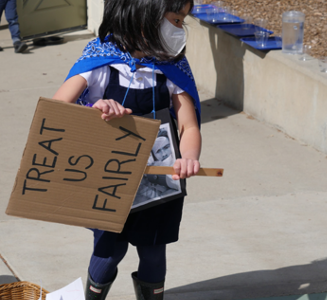Click here to listen to this week’s JAM – Compassion and Idealism
Monday morning a small group of us met at the Moir Building. The event? A conversation with Robert Wright, a retired teacher from San Jose who had worked at the Moir Building in the late 1960s and early 1970s with the United Farm Workers. We first learned about Robert last summer in an article by San Jose Mercury News columnist Sal Pizarro that highlighted how the Moir Building, our main classroom building for the Upper School campus, was the headquarters for the UFW.
Robert had not been in the building for nearly 50 years, and he later shared that it had been a powerful emotional experience returning to the space. He pointed out the location of the entrance at that time and stood where his desk had been. He was the receptionist – a position he held for several years without pay – and he described greeting people as they entered the building, answering the phones (no answering machines or cell phones back then!), and using the Rolodex to reach out to people as they organized marches and other protests during the Grape Boycott. He shared stories of the Fiesta de las Rosas Parade, which took place in the Spring of 1969, a parade that apparently ended with a number of members of the UFW being clubbed to the ground by police officers. He also noted that the Peace Center and Boycott Office were located in the building next to the UFW office, and shared that more than once a young man would burst through the door with a draft notice in hand and start telling him how he didn’t want to go to war. After listening for a while and agreeing with the reasons, he would suggest the young man visit the office next door.
He also talked about Cesar Chavez, noting that he was an exceptional person with extraordinary charisma. He described how Chavez spoke about non-violence and emphasized that when movements turned violent it was always the little person who was the one who got hurt. Robert described his time at the UFW as a period of idealism and altruism, and noted that the farmworker movement and the antiwar movement brought out the best in him and those who were around him.
One of the questions we were interested in was how Robert thought we might honor the legacy of Cesar Chavez, Dolores Huerta, and the UFW as we open our new campus. His eyes lit up at the question. As a former teacher – 38 years teaching 7th grade English, he had already shared with us how inspiring he found our school and program, noting several times that he wished he could have worked with us on this project. He said he could not imagine a more appropriate legacy for the building than to have a high school committed to compassion and idealism, qualities that were at the heart of the work of the UFW.
In the year ahead, we will continue to reach out and learn more about this extraordinary moment in the building’s history, and we are excited to see how we can integrate the history into our programs in the years ahead. As a school deeply committed to social justice and to a vision that calls upon us to reach beyond and make a difference in the world, I know that I will often close my eyes in the years ahead and imagine Cesar Chavez, Robert Wright and the UFW team gathered on the first floor of our building. Their memory will hopefully give us the courage and strength, and the compassion and idealism, to be the school and the community we aspire to be.

